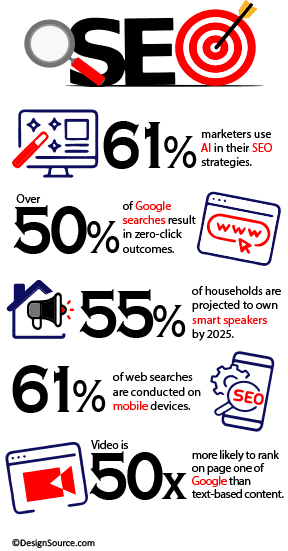15 Mar The Future of SEO: What Businesses Need to Know
Search Engine Optimization (SEO) is constantly evolving, and businesses must stay ahead of the curve to remain competitive in the digital landscape. As search engines like Google refine their algorithms and user behaviour shifts, the future of SEO is shaping up to be more dynamic than ever. Here’s what businesses need to know about where SEO is headed and how they can adapt to these changes.
1. AI and Machine Learning Will Dominate Search
Artificial Intelligence (AI) and machine learning have already transformed how search engines rank content. Google’s AI-driven algorithm, RankBrain, and its more recent Multitask Unified Model (MUM) prioritize understanding search intent over simple keyword matching.
What Businesses Should Do:
- Focus on high-quality, informative, and engaging content that satisfies user intent.
- Optimize for voice and natural language searches, as AI continues to refine search capabilities.
- Leverage AI tools for keyword research, content optimization, and data analysis.
2. The Rise of Zero-Click Searches
 More users are getting their answers directly from search results through featured snippets, knowledge panels, and local packs—resulting in zero-click searches. This means that businesses may struggle to attract clicks to their websites despite ranking well.
More users are getting their answers directly from search results through featured snippets, knowledge panels, and local packs—resulting in zero-click searches. This means that businesses may struggle to attract clicks to their websites despite ranking well.
What Businesses Should Do:
- Optimize for featured snippets by answering common industry-related questions concisely.
- Utilize structured data markup (schema) to enhance visibility in search results.
- Strengthen brand presence across platforms like Google My Business and social media.
3. Voice and Visual Search Optimization
With the increasing popularity of smart speakers and visual search tools like Google Lens, businesses must prepare for searches beyond text input. Users are becoming more reliant on voice-activated devices and image-based search to find relevant information quickly and easily.
What Businesses Should Do:
- Implement conversational, long-tail keywords that match natural speech patterns.
- Use high-quality images with relevant alt text and metadata to improve visibility in visual search.
- Ensure content is mobile-friendly, as voice searches are often conducted on mobile devices.
4. The Importance of Core Web Vitals
Google has made user experience (UX) a ranking factor, emphasizing page speed, interactivity, and visual stability through Core Web Vitals. Websites that fail to meet these performance metrics may see lower search rankings and higher bounce rates.
What Businesses Should Do:
- Optimize site speed by compressing images, using fast-loading hosting services, and minimizing JavaScript.
- Improve mobile responsiveness to enhance usability on smartphones and tablets.
- Ensure a seamless, intuitive website design that prioritizes user engagement.
5. Content Experience Over Keywords
Content marketing is no longer just about keyword stuffing; it’s about delivering value through an excellent user experience. Google rewards content that keeps users engaged, answers their questions comprehensively, and provides a satisfying browsing experience.
What Businesses Should Do:
- Focus on topic clusters rather than standalone keywords, creating authoritative content hubs.
- Incorporate multimedia elements like videos, infographics, and interactive tools.
- Keep content updated and relevant to maintain search rankings.
6. Local SEO Will Be More Important Than Ever
As Google refines local search algorithms, businesses with a strong local SEO strategy will gain a competitive advantage. More consumers are searching for local services and products, making local optimization a key growth strategy.
What Businesses Should Do:
- Optimize Google My Business profiles with accurate information and regular updates.
- Encourage customer reviews to boost credibility and rankings.
- Use localized content to attract nearby customers.
7. The Growing Role of E-E-A-T (Experience, Expertise, Authoritativeness, and Trustworthiness)
Google evaluates content based on credibility, particularly for YMYL (Your Money, Your Life) topics such as health, finance, and legal matters. Businesses that demonstrate expertise and build trust with their audience will rank higher in search results.
What Businesses Should Do:
- Showcase expertise by publishing well-researched and fact-checked content.
- Secure high-quality backlinks from reputable sources.
- Maintain transparency by providing author bios and citing credible references.
The future of SEO is driven by AI, user experience, and content relevance. Businesses that adapt to these evolving trends will stay ahead of the competition and continue to thrive in the digital world. By focusing on intent-driven content, optimizing for new search formats, and enhancing technical SEO, companies can build a robust strategy that stands the test of time.


